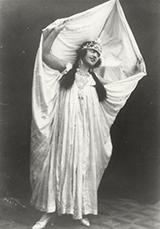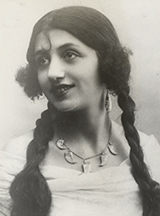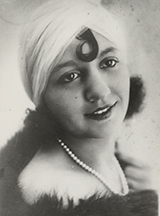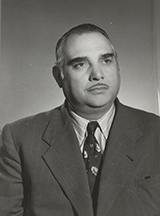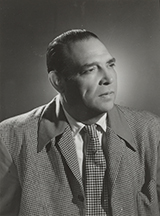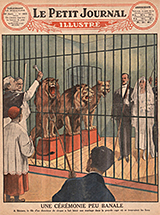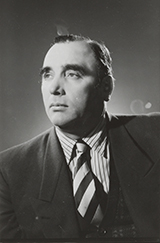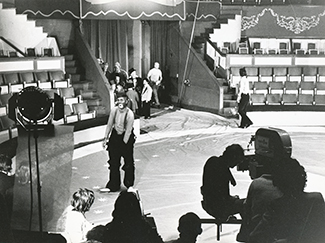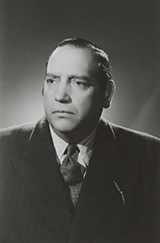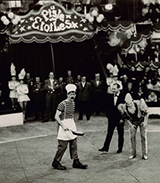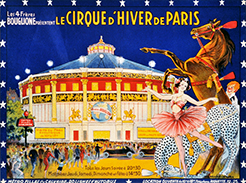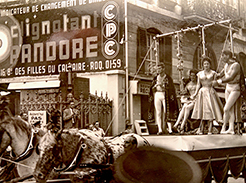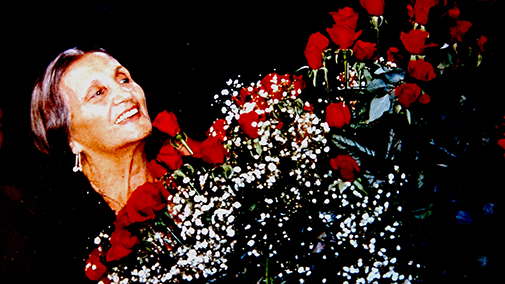by Marika Maymard
To all those who knew her, artists, employees, partners at the Cirque d’Hiver and other witnesses to this prestigious microcosm, she was always Madame Rosa.
She was the wife of the director and patriarch Joseph Bouglione, Monsieur Joseph. But oddly enough, as she approached and then surpassed the age of a hundred, she became known simply as Rosa Bouglione, as if her aura and majestic presence, benevolent and playful in equal measure, were sufficient to bestow her name with an unwavering respect.
Rosalie Van Been was born in Ixelles, in Belgium on 21 December 1910, in the fairground menagerie of her father, Jules Van Been (1887-1930), who was married to the Italian acrobat Ambroglia Carolina Gina Pinitente (1889-1974). She lived in a “travelling” caravan, in daily contact with the animals she trained to tame. As a teenager, renamed Miss Holga, she twirled around in a white dress among the wild animals in the cage-cum-theatre of her family’s establishment, adapting the Danse Serpentine created by Loie Fuller in 1900 for the circus for the first time. Travelling performers would meet at fairs, mingle, observe each other and do business together. The young Joseph Bouglione (1904-1987) – son of Sampion I (1875-1941), whose family also ran a fairground menagerie, “La Fosse aux lions” – noticed the young Rosa very early on. They had to wait until the girl’s eighteenth birthday to get engaged, before marrying at the church of Saint-Jude in Béziers on 4 January 1928. In the photo on the back cover of Le Petit Journal Illustré of 22 January, the young bride in a white dress complete with train appears alongside her new husband for the wedding blessing in the lion’s cage of the four Bouglione brothers’ travelling Stade de Buffalo Bill; the prudent Canon Giniez blesses them through the bars.
She gave birth to seven children, forming the fifth generation of the Bouglione dynasty, which began in 1782 with the birth of Michel Boglione: Sampion III (1938-), Emilien, known as Julot (1934-), Alexandrine, known as Sandrine II (1936-), Firmin II (1932), Odette (1929-), Josette (1930-) and Joseph, known as Zézé, (1942-), all of whom grew up in the world of the circus, sharing ring specialities. Their names appeared in the programmes of family or partner circuses and they married the children of French or foreign circus families, as did their children in turn. Joseph’s widow since August 1987, she became the matriarch of the circus, presiding majestically over the destiny of the Cirque Hiver-Bouglione and watching over three generations of the Bouglione clan and associated families, with an attention imbued with an underlying serenity. When she reached her century, she finally violated the ban instigated by the patriarch, her husband, who secretly protected the history of the family, and drew on her childhood exercise books, written while on the road, to create a book of her memories as a travelling performer: Un mariage dans la cage aux lions [Éditions Michel Lafon, 2011].
With discreet glory, she was a heavily involved observer of events both inside and outside the Cirque d’Hiver. The family and the artists in its circle got through World War II by resisting the Nazi occupiers in their own way. Entertainment entrepreneurs, open-minded towards developments in the industry, the Bouglione family fostered the creation of projects they called circus operettas, such as La Perle du Bengale, a version of Snow White or Robin Hood, led by the clowns Alex and Zavatta. In 1956, they hosted Burt Lancaster, Tony Curtis and Gina Lollobrigida with the crews of the film Trapeze [Carol Reed, 1956] and the filming of Le jour où le clown a pleuré [The Day the Clown Cried], directed by and starring Jerry Lewis but never finished. Always in her box, Rosa Bouglione never missed a performance of the Piste aux Étoiles, the Gala de la Piste, the Gala de l’Union des Artistes, nor of the Festival mondial du cirque de demain, from its eleventh edition in 1985 to its twenty-sixth in 2005.
It was at the age of 107 and a half, on 26 August 2018, twenty years to the month after the death of her husband Joseph, that Rosa Bouglione passed away. A legendary dynastic figure, there is no doubt that she helped turn a page in the history of a circus rich in contradictions, steeped in conventions and ideals, traditions and, all in all, innovations, a melting pot of human destinies and artistic careers, all shaped under the mischievous gaze of Madame Rosa.



